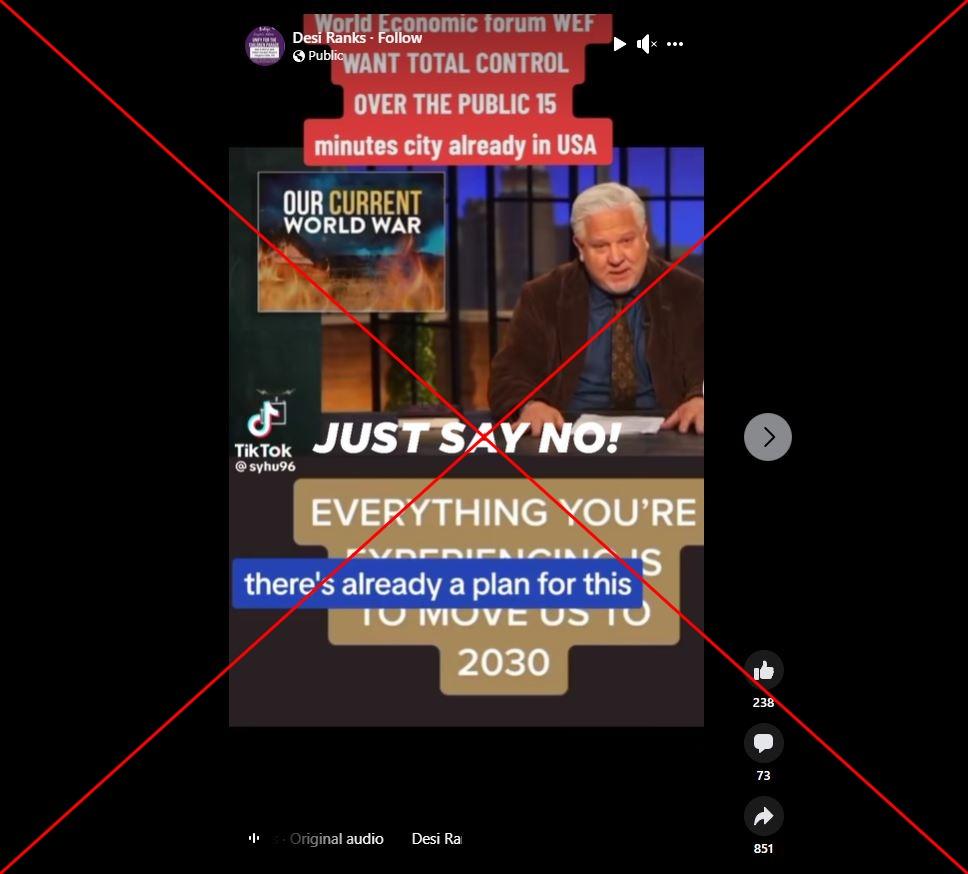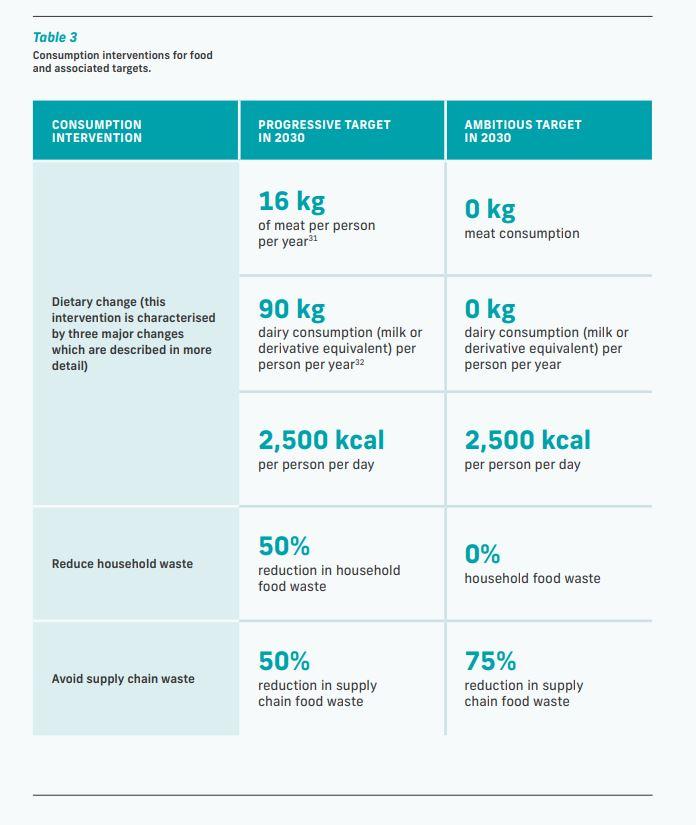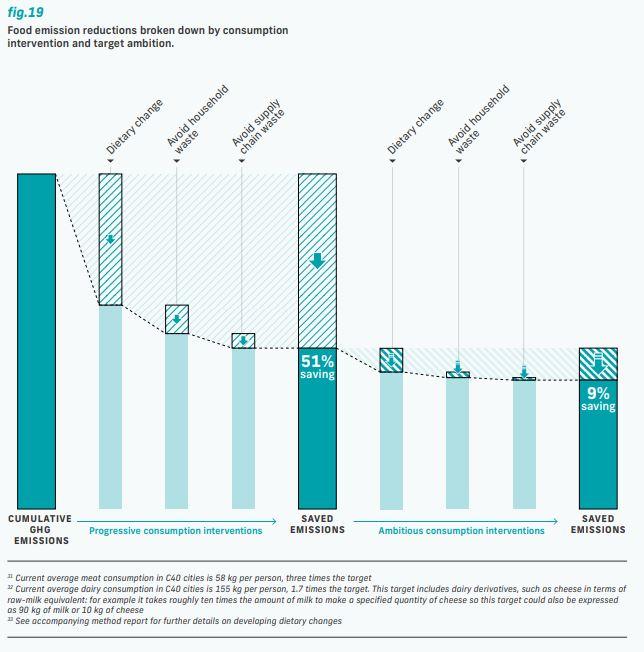
Glenn Beck misleads on climate report, meat consumption
- This article is more than two years old.
- Published on July 10, 2023 at 22:00
- 4 min read
- By Daniel FUNKE, AFP USA
"The World Economic Forum calls them smart cities, which seems great. Progressive urban designers like the UK-headquartered Arup Group, they have their own section on the WEF website. They're gaming what smart cities might look like," Beck says in a video published June 30, 2023 on Facebook.
"Their plan for 2030: Your family will eat zero amounts of meat and zero amounts of dairy. Each person will be restricted to 2,500 calories a day. What? Each family member will only receive three new items of clothing per year."
The reel, originally posted June 17 on TikTok, accumulated hundreds of thousands of views across platforms. Text over the clip says: "World Economic Forum WEF WANT TOTAL CONTROL OVER THE PUBLIC 15 minutes city already in USA."

The footage stems from a January 2023 episode of Beck's show on The Blaze, a conservative media company he created after leaving Fox News in 2011. Similar claims about WEF restrictions have circulated on Instagram and Twitter -- including in Spanish.
"A report published in 2019 states that humans will only be permitted to buy three items of clothing per year and will be prohibited from buying or consuming meat‼️" says a July 6 tweet.
The WEF, an international non-governmental organization that meets annually in Davos, Switzerland, is a frequent target of online disinformation. AFP has previously debunked claims that the group wants to ban eggs and force people to eat insects.
Rumors of meat and dairy restrictions are similarly inaccurate, according to the WEF, which has no authority over governments or policy.
"While the World Economic Forum is contributing to reflect about how to sustainably and nutritiously feed a growing global population, our organization has no plan to restrict people's nutrition," said Yann Zopf, the group's head of media, in a July 7, 2023 email, calling the claims "completely false."
'Not a plan for cities to adopt'
To support his segment, Beck cites a June 2019 report from the C40 Cities Climate Leadership Group titled "The Future of Urban Consumption in a 1.5C World" (archived here). The group, a global network of nearly 100 mayors working to combat climate change, has a page on the WEF website (archived here).
"In 2017, emissions associated with food were estimated to account for 13 percent of total consumption-based emissions across C40 cities," says the report, whose stated goal is to "inspire practical action."
"Roughly three-quarters of these emissions stem from consumption of animal-based foods, with the remaining 25 percent from consumption of plant-based foods," it says.
The study -- a collaboration between C40 Cities, Arup and the University of Leeds -- modeled how five different food-related interventions would affect the progression of global warming. The report includes both "progressive" and "ambitious" targets for 2030.
The latter scenario posits zero kilograms of meat and dairy consumption, a limit of 2,500 calories per day and zero household food waste.
"If C40 cities change their food consumption habits in line with the identified progressive targets, the category’s emissions could be cut by 51 percent between 2017 and 2050," the report says. "The adoption of ambitious targets would enable an additional nine percent reduction."


The study also includes an ambitious target of limiting new clothing items to three per person per year.
But those numbers are not policy recommendations.
"This report does not advocate for the wholesale adoption of these more ambitious targets in C40 cities; rather, they are included to provide a set of reference points that cities, and other actors, can reflect on when considering different emission-reduction alternatives and long-term urban visions," the document says.
The group confirmed the report "is an analysis of consumption-based emissions in C40 cities, not a plan for cities to adopt."
"It's up to individuals to make their personal lifestyle choices, including what type of food to eat and what type of clothing they prefer," a spokesperson said in a July 10 email.
AFP reached out to Beck for comment, but a response was not forthcoming.
'Smart cities' unrelated
The WEF leads the G20 Global Smart Cities Alliance on Technology Governance, an initiative aimed at "ensuring responsible and ethical use of smart city technologies." Arup is a partner on the project (archived here).
But the 2019 climate report makes no mention of smart cities, which have been the subject of numerous conspiracy theories.
Through the WEF-led alliance, 36 cities are pioneering projects to improve access to amenities and plan for forthcoming technologies, such as autonomous vehicles. Beck also references the 15-minute city urban design philosophy which is attributed to Carlos Moreno, a computer scientist and entrepreneur at Paris's Sorbonne University.
Moreno previously told AFP the concept aims to "face up to our ecological, economic and social challenges" by reducing car use and commuting times.
"Never have there been proposals for restrictions -- on the contrary, this is a new opportunity: more choice, more services, more desire to thrive in one's neighborhood while having the choice to go where we please," he said.
"Since the start of 2023, the concept of the 15-minute city has been subject to conspiracy theories, produced and shared by people already well-known for spreading disinformation about Covid, the climate, vaccines and politics."
AFP has fact-checked other false and misleading claims about the WEF here, here and here. More reporting about 15-minute and smart cities is available here, here and here.
Copyright © AFP 2017-2026. Any commercial use of this content requires a subscription. Click here to find out more.
Is there content that you would like AFP to fact-check? Get in touch.
Contact us




